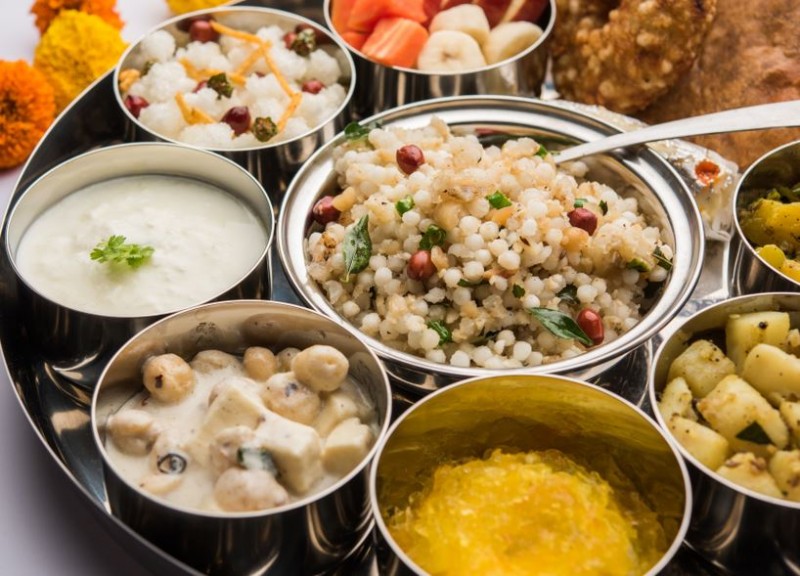
Fasting during the sacred month of Sawan, dedicated to Lord Shiva, is a significant spiritual practice for many. However, fasting can sometimes lead to feelings of weakness or fatigue if not managed properly. To help you maintain your energy levels and stay healthy throughout the month, here are some detailed strategies and tips:
1. Balanced Meals
During the non-fasting periods, it's crucial to eat balanced meals that provide sustained energy. Focus on including:
Complex Carbohydrates: Foods like whole grains (e.g., brown rice, quinoa), legumes (e.g., lentils, chickpeas), and vegetables that are rich in fiber. These foods release energy slowly, helping to keep your blood sugar levels stable.
Proteins: Incorporate sources of lean protein such as tofu, paneer, or eggs. Proteins are essential for muscle maintenance and overall energy.
Healthy Fats: Include sources of healthy fats such as avocados, nuts, and seeds. These fats provide long-lasting energy and support overall health.
2. Hydration
Staying hydrated is vital, especially when fasting. Dehydration can lead to fatigue and weakness. To ensure proper hydration:
Drink Water: Consume ample amounts of water during non-fasting hours. Aim for at least 8-10 glasses a day.
Fluid-Rich Foods: Include hydrating foods such as cucumbers, melons, and oranges in your diet. These foods help maintain hydration and provide essential nutrients.
Electrolyte Balance: Consider drinking electrolyte-rich beverages or coconut water to replenish lost minerals.
3. Include Energy-Rich Foods
To maintain high energy levels, incorporate the following energy-rich foods into your diet:
Nuts and Seeds: Almonds, walnuts, chia seeds, and flaxseeds are excellent sources of energy and essential nutrients.
Dried Fruits: Dates, raisins, and apricots are packed with natural sugars and can provide a quick energy boost.
Complex Carbohydrates: Foods like sweet potatoes and oats can provide sustained energy throughout the day.
4. Avoid Processed Foods
Processed and sugary foods can lead to energy crashes and offer little nutritional value. Instead:
Choose Whole Foods: Opt for fresh fruits, vegetables, and whole grains that provide essential nutrients and energy.
Limit Sugary Snacks: Avoid sugary snacks and drinks that can cause rapid spikes and subsequent drops in blood sugar levels.
5. Opt for Light and Nutritious Snacks
If your fasting routine allows for snacks, choose light and nutritious options such as:
Fruits: Apples, bananas, and berries are easy to digest and provide vitamins and energy.
Yogurt: A good source of protein and probiotics, yogurt can be both satisfying and beneficial for digestion.
Smoothies: Blend fruits, vegetables, and a small amount of protein (like yogurt or almond milk) for a nutritious and energizing drink.
6. Regular Meal Timing
Maintaining regular meal times before and after fasting periods helps regulate your metabolism and ensures your body receives necessary nutrients. Consider:
Consistent Meal Times: Eat your pre-fast and post-fast meals at consistent times each day to help stabilize your energy levels.
Avoid Overeating: Don’t overeat during non-fasting periods. Instead, focus on eating moderate portions of nutritious food.
7. Exercise Wisely
Exercise can be beneficial, but it’s important to choose activities that won’t deplete your energy. Consider:
Light Activities: Engage in gentle exercises like walking, stretching, or yoga. These activities can help maintain your energy without causing exhaustion.
Avoid Intense Workouts: High-intensity workouts can be draining and may lead to fatigue. Save intense exercise for after the fasting period if possible.
8. Rest and Relaxation
Adequate rest and relaxation are crucial for maintaining your energy levels. Incorporate:
Proper Sleep: Ensure you get enough restful sleep each night. Aim for 7-8 hours to help your body recover and stay energized.
Stress Management: Practice relaxation techniques such as meditation, deep breathing, or mindfulness to manage stress and enhance overall well-being.
By following these detailed tips and strategies, you can effectively manage your energy levels and avoid weakness during fasting in Sawan. This approach will not only support your spiritual practices but also ensure that you remain physically healthy and energized throughout the month.
Does Eating Coconut Raise Cholesterol? Debunking the Myths
Finnish Olympic Team Enhances Health Protocols for Paris 2024
Follow This Trick: Cut Out Processed Sugar for 30 Days and See These Benefits